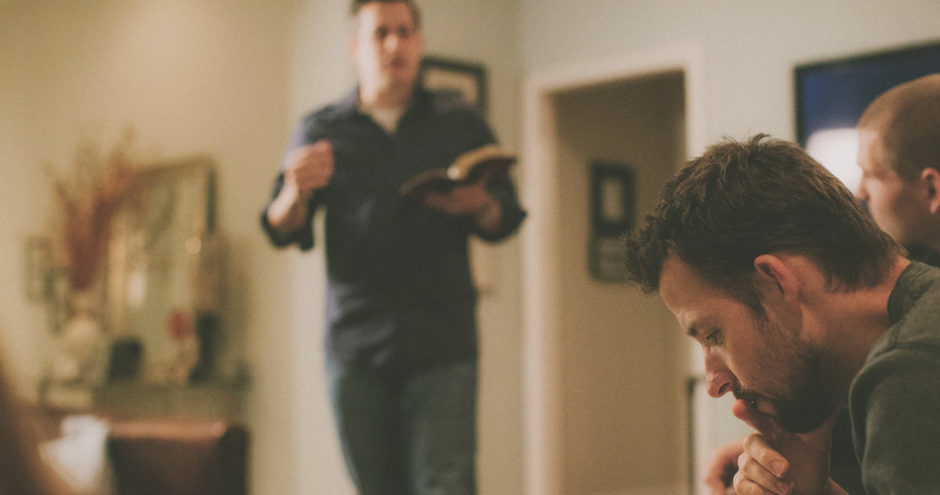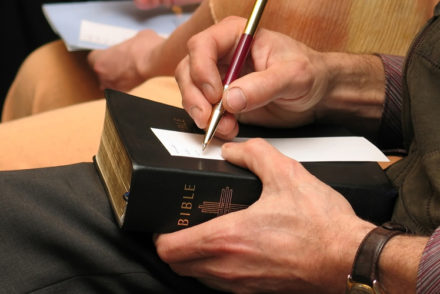Recently, there has been a renewed emphasis on Jesus’ calling on our lives to make disciples. In recent years, we have sought to make disciples through “brain dumping,” filling the mind with facts about Jesus and the Bible through sermons, classes, and books. Though knowledge is indispensable to the Christian life, often our contemporary approaches to discipleship look very different from Jesus’ own model. The master’s plan meant prioritizing the relationship with just a few disciples, pouring the entirety of his life into them during his years of ministry. Discipleship isn’t just intellectual; it’s relational. If we hope to obey the Great Commission, we must herald the Gospel and open up our lives to others. We must take young men and women under our wing—teaching them, setting an example for them, and guiding them as they follow Christ.
Though we may have recently strayed from Christ’s original vision, church history is littered with examples of powerful models of discipleship. One example is the life and friendship of Princeton Seminary Professors Archibald Alexander (1772-1851) and Charles Hodge (1797-1878). In this post, I wish to describe their relationship together, and hold it up for us as a model and example of discipleship for our day.
Charles Hodge and Archibald Alexander
The young Hodge grew up in the Presbyterian church and was catechized by his mother. Hodge lost his father at a young age, leaving a vacancy of paternal affection later to be filled by his mentor, Archibald Alexander. When Hodge enrolled into Princeton Seminary, he quickly experienced the high expectations of his professors. However, as Hodge watched and learned from Archibald Alexander, he became captivated by the man’s piety. Alexander noticed the brilliance and potential of Charles Hodge, and invited his student on a traveling preaching tour through Virginia in the fall of 1816.
As the two traveled many miles by horseback and stage coach, their conversations began to reveal the possibility of a symbiotic relationship. Hodge became enthralled with the spirituality of his professor, and the professor saw a respectful and malleable young man to help reproduce his vision of the Christian life. Hoffecker comments on the reciprocal relationship of the two when he states, “Hodge found in Alexander the maturity and counsel that he had lacked in his youth and adolescence because of the early death of his father. In turn, Alexander found in this young protégé an impressionable and pliable spirit that could be readily shaped for service to the seminary and the church.”[1]
Hodge’s admiration for his professor only grew as Alexander continued to invest in Hodge. Thus began a friendship that would endure for decades. Hodge eventually joined the faculty of Princeton Seminary, working alongside his friend and mentor. Hodge saw in his professor a model for Christian piety that he longed to replicate within his own life. Hodge’s son, A. A. Hodge, would later comment that he was “molded more by the character and instructions of Dr. Archibald Alexander, than by all other external influences combined.”[2] Like a sponge, Hodge soaked up Archibald Alexander’s wisdom and example. Alexander gladly returned Hodge’s filial love.
Alexander and Hodge developed a recognizable familial bond. The men were two kindred hearts who became family. Over the course of their lives, the two men were more than friends and colleagues. The two became father and son. Alexander filled in the void of a fatherly figure for the young Hodge, and that paternal relationship only grew through the years. Alexander, filled with fatherly affection for Hodge, shaped Hodge into the man he became. Hodge, the loving son, looked to Alexander as an example to imitate, continually seeking the man’s counsel and guidance throughout his life. The two men became family.
Alexander’s Death
Before Alexander’s death, he summoned Hodge to say his final goodbyes on October 12, 1851. On his death bed, Alexander extended his hand and called Hodge his son. Alexander gave him a white bone walking-stick, a token symbolizing Alexander’s vision for the seminary. As he passed the symbol to Hodge, he said, “You must hand this to your successor in office, that it may be handed down as a kind of symbol of orthodoxy.” Hodge received the mantel from his mentor to continue to advance the Princeton vision, the unique mingling of confessional orthodoxy with experimental piety. Charles Hodge recorded the final goodbye to his spiritual father:
“‘I wish you to know my views of my case now, and I want to speak to you while I have strength. I consider it one of my greatest blessings that I have been able to bring you forward, and now, my dear son, farewell. You will not see me again.’” I was, as you may suppose, greatly humbled and affected by this address from the man to whom I owe so much. I sank on my knees by him and kissed his hand. He told me to pray. I did so for a few sentences. He said, with emphasis, “Amen,” and again giving me his hand said, “farewell.”[3]
At that, Alexander said his final good bye to his son in the faith. A. A. Hodge notes that when his father returned to his study after that final visit, his father stood, “In agony of weeping, exclaiming, ‘It is all past, the glory of our Seminary has departed.’ At the funeral he walked with the sons, claiming to be a true son also.”[4] Hodge commented on his relationship with Alexander that ever since their first meeting, Alexander “has ever since acted to me as a father, and God has given me grace to love and revere him as a child would such a father.”[5]
Lessons for Discipleship
What can be learn about discipleship from Archibald Alexander and Charles Hodge? Let me briefly suggest three lessons.
First, discipleship involves inviting others into the rhythm of our lives. Alexander was intentional about investing time with Hodge, inviting him on his travels, and sharing meals with him. We must do the same.
Second, discipleship takes time. We often think of discipleship as a four-week class, and then it’s over. However, Hodge and Alexander both model a lifelong discipleship where they learned and grew together.
Third, discipleship creates a legacy. Alexander’s legacy continued long after his death by his investment in his son in the faith, Charles Hodge. The greatest investment we can make is in the next generation.
Next time you think of discipleship, think about the example of Archibald Alexander and Charles Hodge. Learn from them, and go and do likewise. Go and make disciples.
********************************
NOTES
[1] W Andrew Hoffecker, Charles Hodge: The Pride of Princeton (Phillipsburg, N.J: P & R Publishing, 2011), 50.
[2] A. A. Hodge, The Life of Charles Hodge: Professor in the Theological Seminary, Princeton, N.J., 47.
[3] Ibid., 383
[4] Ibid., 382.
[5] Ibid., 383.





No Comments